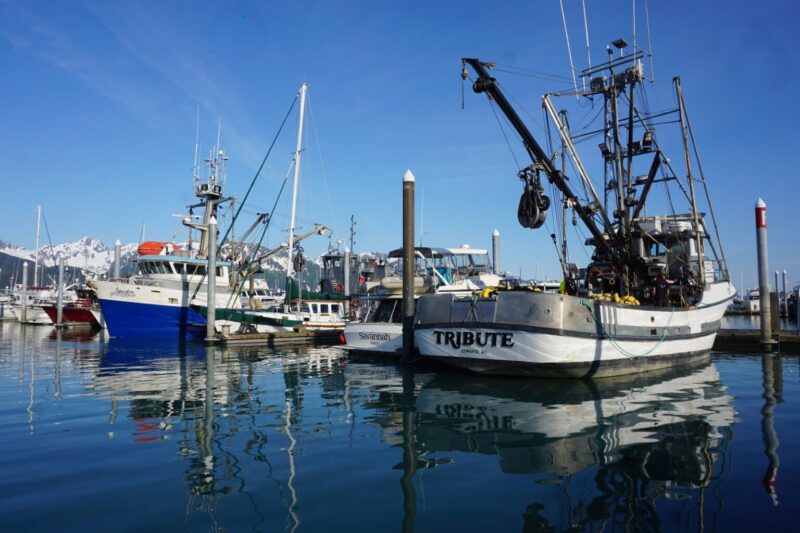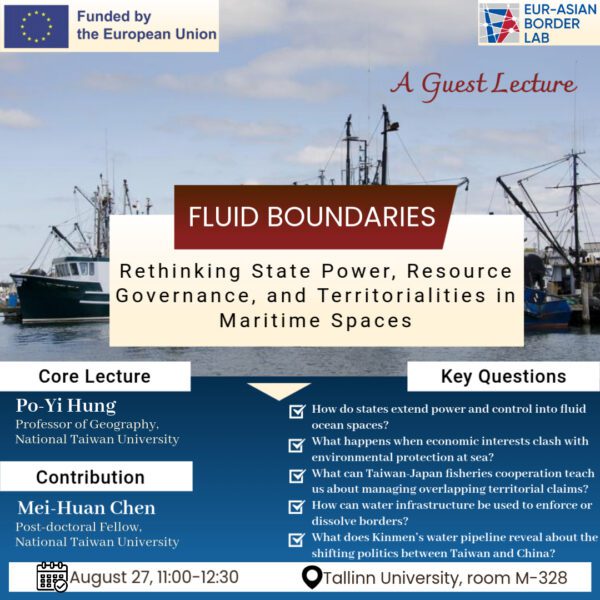
The Eur-Asian Border Lab in collaboration with the Taiwan-Estonia Cooperation Programme invites you to a guest lecture on maritime governance and territorial disputes with Professor Po-Yi Hung of National Taiwan University. How do states extend power and control into fluid ocean spaces? What happens when economic interests clash with environmental protection at sea? This talk examines these questions and more through the lens of Taiwan’s experience navigating complex territorial disputes while developing its offshore economy.
In addition, Mei-Huan Chen, a Post-doctoral Fellow at National Taiwan University, will give a short talk on “Bordering and Debordering through Water Infrastructure – the Case of Kinmen,” exploring how water systems can serve as both tools of separation and connection in cross-strait relations between Taiwan and China.
Details
- When: August 27, 2025, 11:00 – 12:30
- Where: Tallinn University, Room M-328 (Mare Building)
- Registration: Pre-registration is required. Please register here.

Core lecture
Po-Yi Hung’s lecture explores the complex and evolving nature of maritime borders, focusing on how state power, resource governance, and territorialities are produced, contested, and reshaped in ocean spaces. Drawing on case studies from Taiwan’s offshore wind farm development, the politics of fisheries management, and the Taiwan–Japan fisheries agreement, it interrogates how international legal frameworks like UNCLOS have enabled the expansion of state authority at sea, established zones for resource extraction and conservation, and generated new forms of ocean enclosure and “ocean grabbing.” The talk examines the tensions between economic use (such as green energy and fisheries) and ecological protection, showing how both depend on and reinvent maritime boundaries. It further analyses overlapping and “grey zone” territorialities – such as the cooperative yet contested management of the Senkaku/Diaoyu region – and highlights how law enforcement, bilateral agreements, and technological surveillance co-produce governance and state effects in fluid, dynamic ocean spaces. Integrating perspectives from geopolitical ecology and oceanic materiality, the presentation argues for conceptualising ocean borders as mobile, processual, and more-than-human, emphasising the interconnected and contingent nature of contemporary maritime governance. Ultimately, it calls for rethinking maritime borders as adaptive and politically charged interfaces that shape governance, justice, and sustainability across the “fluid boundaries” of the world’s seas.
Po-Yi Hung is a Professor of Geography at National Taiwan University. He uses food, agriculture, and fisheries as lens to look into border and territoriality, mobility and infrastructure, nature and society. He has conducted research in Taiwan, China, the Highlands of Southeast Asia, and Mauritius in the Indian Ocean. Po-Yi is the author of Tea Production, Land Use Politics, and Ethnic Minorities: Struggling over Dilemmas in China’s Southwest Frontier, published in 2015 by Palgrave Macmillan. His latest studies focus on two themes: one is about water and tea production under climate change, and the other is the geopolitical ecology of fisheries. The University of Washington Press will publish his forthcoming book, Routes of Taiwan Tea: Mobility, Borders, and Territoriality.
Contribution
Mei-Huan Chen’s talk examines how water infrastructure has been deployed as a tool of both bordering and debordering on the Kinmen Islands. During the Cold War, Kinmen’s water infrastructure was part of the bordering campaign for the Republic of China (ROC, Taiwan) to counter Communist China. Today, a cross-strait pipeline transferring water from China’s Fujian province to Kinmen serves as a debordering tool for the PRC. Drawing on critical infrastructure studies, Mei-Huan argues that water infrastructure holds the capacity to serve these political purposes as it allows circulation of things, functions as vital systems, and represents progress, modern life, and state care. Yet, these processes were far from smooth but shaped by other socio-material factors. The militarised conditions, the islands’ environmental constraints, and Taiwan’s shifting party politics have disrupted these processes and influenced how infrastructures materialised.
A human-environment geographer, Mei-Huan Chen earned her PhD in Geography at the Pennsylvania State University and her Master’s in Building and Planning from National Taiwan University.
——————————————————————————————
Project no 101077207 „Advancing Trans-Regional Border Studies“ is funded by the European Union.